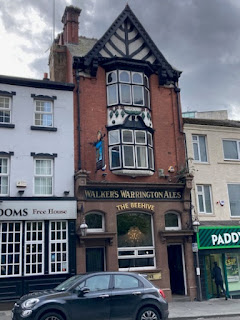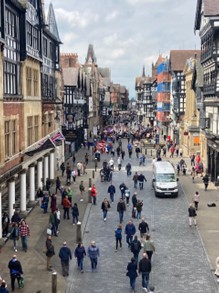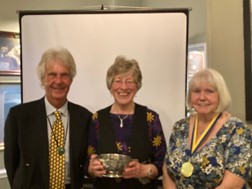Thursday 12 June, 2025
Spring Weekend 2025 Liverpool By Iris C Gibson
The Beatles, Gerry and The Pacemakers, The Merseybeats and now, Rovers! Talent, charisma, and a willingness to enjoy life — they had / have it all!
The omens were with us this year — no rail strikes or planned motorway road works, with a forecast of good weather. The majority of the (smaller than usual group (9)) travelled there by train although Iris and Ruth opted to drive down, only to be scuppered by a meltdown in their navigation system. However, not all was lost as they now have a surprising knowledge of the villages to the North-East of Liverpool and a greater appreciation of “old-fashioned” road atlases!
We all met for Friday evening dinner at our hotel — Premier Inn 1 in Hanover Street. This was an excellent, central location and only a few minutes from Liverpool Street Station. The staff were polite and helpful but as usual, were diving about like mad things following the on-going staff cuts throughout the Premier Inn system. This is an increasingly regular feature of similar type hotel chains but, as we were only really there in the mornings and later evenings, it was manageable.
On Saturday morning, apart from Yvonne and her husband Bill who had visited recently, the majority of the group opted to go on the Liverpool On Off Bus Tour on a double decker bus from the Albert Dock. This gave us an overview of the popular sights of the city and included stopping for photo opportunities at the Penny Lane street sign and the gates of Strawberry Fields.
Other sights encountered en route were: John Lennon’s Aunt’s house, who raised him for a number of years; the site of Paul McCartney’s house; Ringo Starr’s house; and the famous statue of the Fab Four at the riverfront.
We also passed the graveyard and church which inspired “Eleanor Rigby”, and streets, pubs, parks (and bus shelters!) mentioned in Beatles’ songs and where Lennon and McCartney wrote some of their famous compositions. I have to say that seeing all these places was really atmospheric, as I grew up listening to them.
We also passed the graveyard and church which inspired “Eleanor Rigby”, and streets, pubs, parks (and bus shelters!) mentioned in Beatles’ songs and where Lennon and McCartney wrote some of their famous compositions. I have to say that seeing all these places was really atmospheric, as I grew up listening to them.
Returning to Albert Dock, we enjoyed one of the many restaurants and cafes which have been opened in the rejuvenated dockland area.
Splitting up, we visited a variety of locations and sights including Liverpool One — a modern eating and retail centre. Saturday evening dinner at a nearby, local Italian restaurant was delightful and we were entertained by the numerous groups of hen party ladies who tottered past in a jolly, if wobbly, state!
Liverpool FC had been playing that day and fans were celebrating their team’s victory in a most restrained and polite manner — an unusual experience from someone who stays out of Glasgow city centre when the Old Firm (Glasgow Rangers and Glasgow Celtic) meet up on the football field. Some of them had travelled from far flung places like Sweden, Spain, and Bulgaria — very dedicated.

The Anglican Cathedral, the UK’s largest cathedral, is an immense and more traditionally styled edifice whose construction experienced similar delays to Liverpool Cathedral but, is an amazing structure. Towering spire, vaulted ceilings, sculpted pillars, arches, altar, organ loft and the Choir are constructed out of beautiful red sandstone and hardwood which together, create a spectacular sight.
Visiting on the Sabbath after morning services, we listened to choir practice while enjoying coffee and cake inside the in-house café — very civilised!
From March to May this year, the Cathedral was hosting the “Helios” exhibition, — a dazzling masterpiece by world-renowned British artist Luke Jerram. This comprises an amazing seven-metre sculpture of the Sun, at 1:200 million scale, where every
centimetre of the sphere represents 2000km of the Sun’s surface. This allows one to view intricate details like sunspots, spicules, and solar flares—features that are usually millions of miles away. To quote the accompanying poster, “This isn’t just art—it’s an experience. With a custom surround sound composition blending solar sounds, NASA mission recordings, and uplifting music, you’ll feel connected to the Sun’s power, warmth, and significance.” For once, the publicity lives up to the blurb and the event is further enhanced by a circle of beanbags under the sculpture, where visitors lie back and bask in the otherworldly experience. I could have spent hours there.
Liverpool, a port and industrial city like Glasgow has also suffered decline of the traditional industries but has worked hard to redevelop and repurpose areas into ones which are appropriate and inviting for a modern populous.
Almost all of the group stayed on until Monday morning which provided us with another enjoyable dinner event, finished off by a nightcap/coffee at the hotel bar. Unfortunately, those travelling back to Scotland by rail suffered a number of delays but all were safely home by the end of the day. Another super weekend — great: sights; food and drink; and company. Many thanks to our VP Diana Porterfield for all her hard work organising it. Bring on Spring Weekend 2026!











































